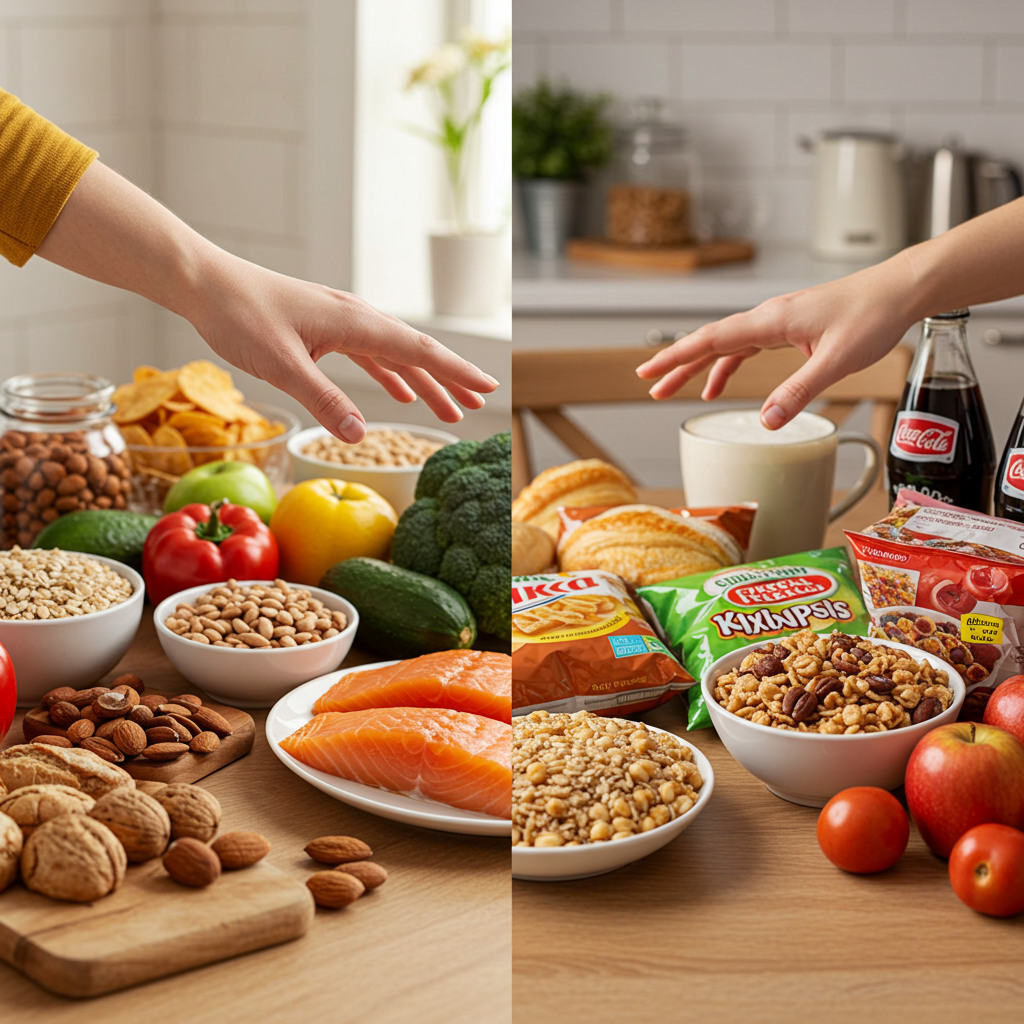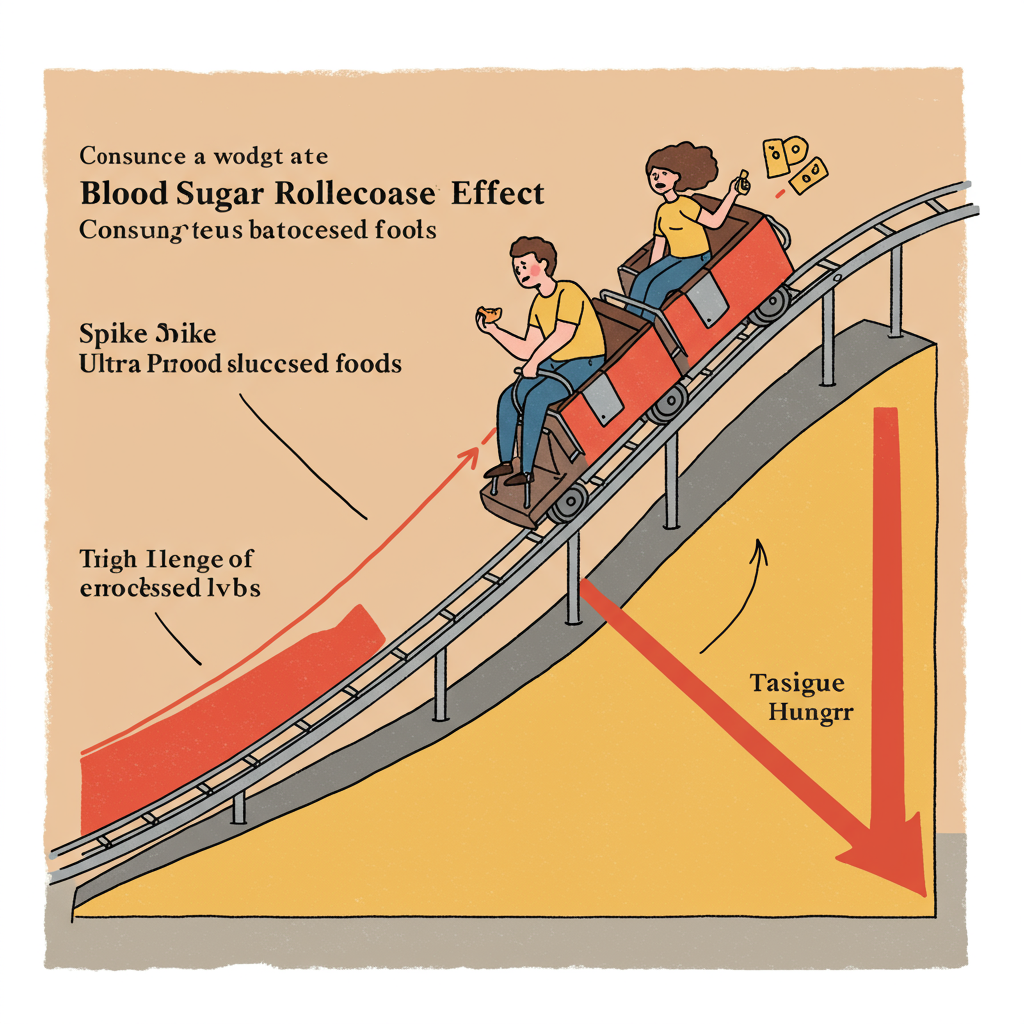The Hidden Danger: How Ultra-Processed Foods Hijack Your Blood Sugar
In our modern food landscape, convenience often trumps nutrition. Ultra-processed foods dominate grocery store shelves, restaurant menus, and unfortunately, our daily diets. While these foods offer immediate satisfaction, they create a silent metabolic storm in our bodies. Today, I want to explore how these manufactured food products dramatically disrupt your glucose metabolism, setting the stage for insulin resistance and potentially type 2 diabetes.
What Makes a Food "Ultra-Processed"?
Ultra-processed foods are industrial formulations containing ingredients you wouldn't typically find in your kitchen. These products go far beyond simple food preservation or cooking methods. They typically contain:
- Refined flours and sugars stripped of fiber and nutrients
- Industrial seed oils high in inflammatory omega-6 fatty acids
- Artificial flavors, colors, sweeteners, and preservatives
- Texturizers, emulsifiers, and other chemical additives
Examples include most packaged snacks, breakfast cereals, flavored yogurts, frozen meals, fast food, sugary beverages, and even seemingly "healthy" plant-based meat alternatives. What sets these foods apart isn't just their ingredient list—it's how profoundly they've been engineered to override your body's natural satiety signals and metabolic processes.

The Blood Sugar Rollercoaster: Your Metabolic Nightmare
When you consume ultra-processed foods, you trigger a dangerous cascade of metabolic events:
1. Rapid Glucose Absorption
Without fiber to slow digestion, the refined carbohydrates in ultra-processed foods are immediately broken down into glucose. This causes a sudden blood sugar spike—far steeper than what would occur with whole foods. Your pancreas responds by pumping out insulin to manage this glucose surge.
2. The Insulin Surge and Crash
The massive insulin response to ultra-processed foods does more than just lower blood sugar. It often overshoots, causing your glucose levels to plummet below baseline. This crash triggers hunger, cravings, and fatigue—setting you up for the next ultra-processed food and continuing the cycle.

3. Inflammatory Response
Ultra-processed foods trigger inflammation through multiple pathways. The refined carbohydrates, industrial seed oils, and chemical additives all activate inflammatory responses. This inflammation further impairs insulin signaling, making your cells increasingly resistant to insulin's effects.
Over time, this pattern of glucose spikes and crashes forces your pancreas to produce more and more insulin to maintain normal blood sugar levels. Eventually, your cells become resistant to insulin's effects—the hallmark of prediabetes and type 2 diabetes.
The Metabolic Destruction Beyond Blood Sugar
The damage from ultra-processed foods extends beyond immediate glucose disruption:
Disrupted Gut Microbiome
Ultra-processed foods lack the fiber that feeds beneficial gut bacteria while containing emulsifiers and preservatives that damage gut integrity. A healthy gut microbiome is crucial for proper glucose metabolism and insulin sensitivity.
Altered Brain Chemistry
The hyperpalatable nature of ultra-processed foods—engineered to hit the perfect bliss point of salt, sugar, and fat—triggers dopamine release similar to addictive substances. This neurological hijacking makes it increasingly difficult to choose whole foods that would better regulate blood sugar.
Circadian Rhythm Disruption
Many ultra-processed foods contain ingredients that interfere with our natural circadian rhythms, which are intimately connected to glucose metabolism. Disrupted sleep patterns further impair insulin sensitivity and glucose regulation.
Breaking Free: Reclaiming Your Metabolic Health
The good news is that our bodies have remarkable healing capacity when we remove the offending agents. Here's how to start reclaiming your glucose metabolism:
Embrace Real Food
Focus on whole, unprocessed foods that still look like they did when they grew in nature. Vegetables, fruits, nuts, seeds, legumes, and if you eat animal products, choose those that were raised humanely and naturally.
Prioritize Fiber
Fiber is nature's way of regulating glucose absorption. Aim for 30+ grams daily from varied plant sources to slow glucose absorption and feed beneficial gut bacteria.
Balance Your Plate
Structure meals to include protein, healthy fats, and fiber-rich carbohydrates. This combination slows glucose absorption and promotes stable blood sugar levels.

Time Your Eating
Consider time-restricted eating patterns that align with your circadian rhythm, giving your insulin system regular periods of rest.
The journey away from ultra-processed foods isn't always easy—these products are designed to be irresistible and ubiquitous. But understanding how profoundly they disrupt your glucose metabolism can be powerful motivation to choose differently.
Your body is designed to thrive on real food, not food products engineered in laboratories. When you align your diet with this simple truth, your glucose metabolism can begin to heal, reducing your risk of diabetes and restoring your natural energy and vitality.
References:
Hall, K. D., Ayuketah, A., Brychta, R., Cai, H., Cassimatis, T., Chen, K. Y., Chung, S. T., Costa, E., Courville, A., Darcey, V., Fletcher, L. A., Forde, C. G., Gharib, A. M., Guo, J., Howard, R., Joseph, P. V., McGehee, S., Ouwerkerk, R., Raisinger, K., ... Zhou, M. (2019). Ultra-Processed Diets Cause Excess Calorie Intake and Weight Gain: An Inpatient Randomized Controlled Trial of Ad Libitum Food Intake. Cell Metabolism, 30(1), 67-77.e3.
Srour, B., Fezeu, L. K., Kesse-Guyot, E., Allès, B., Méjean, C., Andrianasolo, R. M., Chazelas, E., Deschasaux, M., Hercberg, S., Galan, P., Monteiro, C. A., Julia, C., & Touvier, M. (2019). Ultra-processed food intake and risk of cardiovascular disease: prospective cohort study (NutriNet-Santé). BMJ, 365, l1451.






